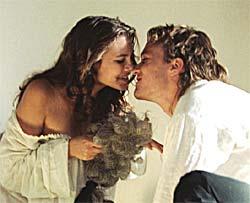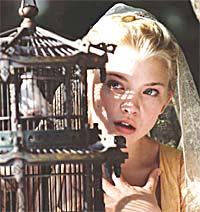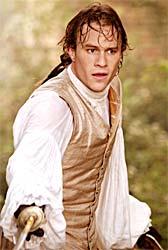 Giacomo Casanova, hats off.
Giacomo Casanova, hats off.
This is a true man of legend. The iconic lover of the 18th Century, he estimated the number of his women at about 1000. His autobiography -- don't all romantics like to chronicle their conquests? -- is regarded as one of the most authentic sources of the norms and customs of life in Venice. This is a man who shared soufflé with Voltaire, ate cake with Catherine the Great, and daringly defied the Inquisition, after being held for witchcraft. Variously held as a diplomat, spy, magician and the inventor of the state lottery -- not to mention the women, Casanova is as special as subjects get.
Director Lasse Hallström, on the other hand, sees in this grand character merely an opportunity for period farce, a corsets-and-caricature run through the canals of Venice, and a structure so painfully contrived that one expects Hugh Grant to be lurking behind a gondola somewhere. His Casanova, while often inevitably reminiscent of John Madden's Shakespeare In Love, crucially lacks wit. The film also lacks verve, panache, chutzpah, spontaneity and old-world charm, but for a movie of this genre, it is the omission of wit that really smarts.
Heath Ledger plays the man of a thousand bedrooms, the charmer who makes nuns recant their faith in God, and vestal virgins rip apart birdcages with sheer lust. He joins the ranks of a peculiar selection of fine actors -- Donald Sutherland, Peter O'Toole, and even Bela Lugosi -- in the part, and, to do him credit, performs it unlike them. While his predecessors essentially delved, in degree, into the complexities of the paramour extraordinaire (Sutherland, in Federico Fellini's version, was the darkest), Heath's role here is confined to a modern rom-com standard. He grins irrepressibly through it all, and while his mask doesn't often slip, there really isn't much he can do.
![]()
More on rediff.com !
![]()
![]()
![]()
![]()
Being Cyrus: Unique![]()
Films that created stars![]()
Aussies to get some bhangra rap![]()
![]()
![]()
Because it's so predictable, you see. Hollywood formulae dictates a player, seducer of many women (think anyone from Chris O'Donnell to Eddie Murphy) stop in his tracks for the one hard-to-get babe with enough spunk to turn him down, then spend the rest of the film wooing her, only to end in a last-scene clinch before the credits merrily roll. Not that there's anything wrong with that kind of typically harmless feel-good love story, but one doesn't expect such fabricated fate to befall a lover of Casanova's stature.
 In his case, the woman is Francesca Bruni. An intellectually gifted female in an age when such are frowned upon, Francesca dons a moustache and male pseudonym, pens philosophy, and despairingly stays faithful to her unseen suitor, Papprizio. She must marry against her wishes to get her family out of financial woes. Is it just me or does this sound increasingly like 70s Bollywood? Sienna Miller stars in this pivotal role, and this is an unfortunate casting decision. While red hair frames Mrs Law's (is she or isn't she still married to Jude? Of course, by the time you read this that situation might have altered yet again) features far better than blonde, she lacks the pluck that Bruni sorely requires. Really, where is Keira Knightley where you need her?
In his case, the woman is Francesca Bruni. An intellectually gifted female in an age when such are frowned upon, Francesca dons a moustache and male pseudonym, pens philosophy, and despairingly stays faithful to her unseen suitor, Papprizio. She must marry against her wishes to get her family out of financial woes. Is it just me or does this sound increasingly like 70s Bollywood? Sienna Miller stars in this pivotal role, and this is an unfortunate casting decision. While red hair frames Mrs Law's (is she or isn't she still married to Jude? Of course, by the time you read this that situation might have altered yet again) features far better than blonde, she lacks the pluck that Bruni sorely requires. Really, where is Keira Knightley where you need her?
But this is not melodrama, of course. This is amusement at its lightest and most superficial, a meaningless charade with an irresistible leading man leaping through lies, and conjuring up hot air balloons when the film demands it. Thankfully, the film never takes itself seriously. But one wishes there was more of an actual concept to his travails, and that we couldn't see the screenplay unfolding as it does. There is, of course, a smattering of half-decent lines, but the laughs aren't half as frequent or as hearty as warranted.
 The actors in supporting roles are impeccable. Oliver Platt is marvellous as Papprizio, the visually appropriate lard king of Genoa. His rotund innocence is a treat, making us long for more. The always-reliable Jeremy Irons is reduced to a complete caricature, a wasted Papal Inquisitor. This is an important part of the Casanova tale, the Church's condemnation of the lover by labelling him a heretic, but isn't given enough room. Irons is funny, but slapstick isn't the thespian's forte. Lena Olin, the director's wife, is simply delicious as Andrea, Francesca's mother. The most applause, however, goes to the diminutive Omid Djalili, the UK's only Iranian stand-up comic, who effortlessly steals scenes as Casanova's valet, Lupo.
The actors in supporting roles are impeccable. Oliver Platt is marvellous as Papprizio, the visually appropriate lard king of Genoa. His rotund innocence is a treat, making us long for more. The always-reliable Jeremy Irons is reduced to a complete caricature, a wasted Papal Inquisitor. This is an important part of the Casanova tale, the Church's condemnation of the lover by labelling him a heretic, but isn't given enough room. Irons is funny, but slapstick isn't the thespian's forte. Lena Olin, the director's wife, is simply delicious as Andrea, Francesca's mother. The most applause, however, goes to the diminutive Omid Djalili, the UK's only Iranian stand-up comic, who effortlessly steals scenes as Casanova's valet, Lupo.
Casanova could have been a really good film, but its too darned obvious. Venice looks mesmerising and breathtaking, the costumes are perfect, and most of the acting is extremely top-notch. Even if Hallström was hell-bent on making nothing but a frothy comedy, there was tremendous potential. Derring-do and derrieres, plumage and promiscuity, seduction and style: it could have had it all. The script passed these up, and what we are handed is a fluffy, meaningless film that isn't worth spending money on. And, as if to make sure, it throws in a helluva stretched ending.
Watching Casanova is like hearing a joke you've heard a dozen times already. You might laugh for various reasons -- the person who's telling the joke, a couple of colourful embellishments, the lack of anything better to do, or just to be polite -- but the joke itself isn't funny.
Rediff Rating: ![]()






 © 2025
© 2025